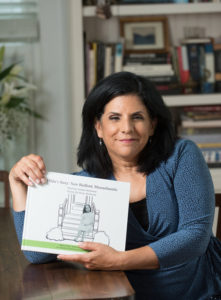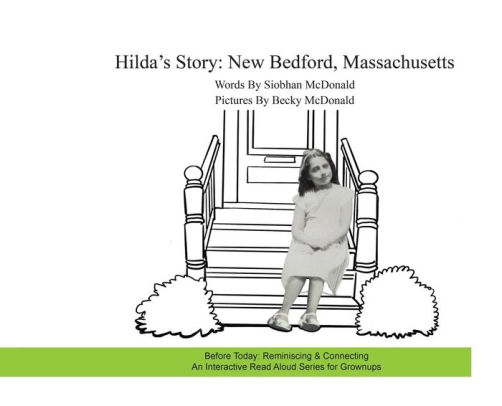This article originally appeared in the January 2020 edition of Senior Scope. Article by Seth Thomas. Photos courtesy of Siobhan McDonald.

Author and artist Siobhan McDonald. Photo by Mike Dean. www.mikedeanphotos.com
Artist and author Siobhan McDonald’s recently published “Hilda’s Story” combines art appreciation with conversation.
During a presentation on Dec. 4 at the Acushnet Public Library, McDonald explored the origins of her new book, which is intended for those living with Alzheimer’s disease and their caregivers.
The book follows a loose narrative about her mother, the eponymous Hilda, but McDonald believes the true focus of her book is the conversation that derives from reading it aloud to someone who’s experiencing memory loss.
The book features black and white photographs from her mother’s youth, and, perhaps most importantly, the story includes questions that serve as prompts to begin a conversation. For instance, on a page featuring a vintage photo of Hilda in a backyard garden, a green graphic asks the audience, “Did you ever have a garden? Tell me about it.”
The idea for a book specifically geared toward those with memory loss developed initially during her time as a public educator. McDonald worked as an art teacher for more than two decades and has been trained in Visual Thinking Strategies (VTS), a teaching strategy developed by Abigail Housen and Philip Yenawine.
Visual Thinking Strategies was created to help young students think critically, and uses art as a conversation starter. Students will view a piece of artwork as a group and make observations about what they see and be asked to provide evidence of their observations.
The basic idea is that, through group discussion and social learning, students will develop reasoning skills that can be applied throughout the curriculum.

The cover of Siobhan McDonald’s book, “Hilda’s Story.”
McDonald has applied this teaching strategy outside the grade-school classroom in art appreciation workshops geared toward an audience with dementia.
During her presentation at the Acushnet Library, McDonald gave the audience a taste of how VTS functions. McDonald displayed a painting on an overhead projector – a Thomas Hart Benton work titled “Wreck of the Old ‘97” – and simply asked, “What’s going on in this picture?”
Participants pored over the details of the painting, and as the audience made observations, McDonald would paraphrase what was said or ask follow-up questions. She did not alter what was said, nor did she tell anyone that their interpretation of the artwork was incorrect.
A similar technique is commonly deployed by those who care for people with memory loss. When reasoning and explaining to a person with dementia fails, caregivers are urged to validate and redirect.
“The thing that drew me to this technique is how non-judgmental it is and how much we can feel like we can enter a work of art,” she said. “We all feel compelled to correct people. Things start opening up when you battle that compulsion and enter their world.”
She said that, while museum patrons tend to either blow through a gallery in an attempt to see everything a museum has to offer or stand silently as they observe a single work, she’s more interested in what we can learn from each other when we’re looking at art.
Across the nation, museums are beginning to offer tours geared specifically toward those with dementia and their caregivers. Docents will ask open-ended questions throughout the tour, which provides the viewer an opportunity to use their imagination and interact with art and with others.
Many of the images in her workshops feature works of art that have a narrative quality to them, and lend themselves to storytelling. Her book drills down on the concept by providing the caregiver a story to share and questions to ask the listener.
“The story would ultimately be the story that happens when you read it to someone,” McDonald explained. “If I’m reading it to someone with dementia, it’s ultimately their story. This is the jumping off point.”
Siohban McDonald’s book, “Hilda’s Story,” is out now through Granger Street Studios. For more info, visit grangerstreetstudios.com.
The Museum of Fine Arts in Boston offers art tours for individuals with memory loss or dementia, and their care partners. The group meets at 10:30 a.m. on the second and fourth Saturday of each month. Pre-registration is required. For more information, or to register, contact Ronit Minchom at 617-369-3302, or e-mail access@mfa.org.


Recent Comments